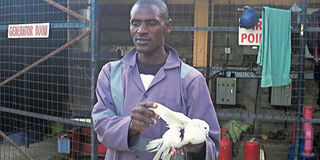We keep our pigeons at the office

Francis Makori with one of the pigeons that they keep in Donholm. Alongside his colleague, Joshua Momanyi, they keep the pigeons at Africa Energy Limited in Donholm; at the backyard of the station. PHOTO | WINNIE LELEI | NMG
What you need to know:
- Pigeons don't need a very special place to rear them.
- Makori and Momanyi’s journey into pigeon keeping began one time when their employer, Hassan Kacha, offered them the bird’s meat during an annual get together with his employees.
- Pigeon droppings make good manure and is best for plants that require less toxic fertiliser such as vegetables and flowers.
- Makori explains that the birds also need some sand and frequent supply of fresh water to ease digestion.
The meek, shy but beautiful birds spend the better part of the day flying around and perching on the roof of the fuel station in Donholm, Nairobi.
Looking at them, one would believe that they are wild living at the mercy of nature as they scrape for morsels in the dustbins of homes and eateries around.
But these birds are kept by Franklin Makori and Joshua Momanyi, workers at Africa Energy Limited in Donholm. They rare them at the backyard of the station.
While pigeons meat is not a common specialty even for lovers of poultry meat, for them, the birds are their ‘chicken’.
“Pigeons don't need a very special place to rear them,” says Makori, while pointing at tens of wooden boxes placed under the roof of the cooking gas shed.
“As long as there is some little space where the birds can feed, they spend the rest of their time chirping on the rooftop.”
Makori and Momanyi’s journey into pigeon keeping began one time when their employer, Hassan Kacha, offered them the bird’s meat during an annual get together with his employees.
“It tasted so good that none of us believed those were pigeons'. The idea to rear pigeons for meat was born on that day. We sourced our first birds from Pembe Industries in Industrial Area,” says Makori, noting they talked to their employer, who gave them the nod to keep them at the station.
Their workplace has now turned into an attraction for both the young and the old. During weekends, they receive dozens of children who want to feed and watch the birds.
“Watching pigeons is quite relaxing,” Momanyi confesses. “Every Saturday morning, we let the birds dive in water and that sight of them playing is alluring.”
The station’s backyard, which hosts plenty of flowers making it beautiful, benefits from the birds dropping.
“Pigeon droppings make good manure and is best for plants that require less toxic fertiliser such as vegetables and flowers.”
The backyard is cleaned once a week, and the dropping collected and stored.
PREVENTIVE MEDICINE
Other than being a source of tasty meat and for beauty, both Makori and Momanyi admit that it is the ease of rearing pigeons that keeps them going.
“We started with just three birds. Now more than 300 of them roam this backyard,” he says.
The birds feed on 2kg of grain a day. Depending on availability, they feed them corn, wheat or millet. Once in a while, they are given boiled sukuma wiki.

The duo's birds during a feeding session. Their journey into pigeon keeping began one time when their employer, Hassan Kacha, offered them the bird’s meat during an annual get together with his employees. PHOTO | WINNIE LELEI | NMG
Makori explains that the birds also need some sand and frequent supply of fresh water to ease digestion.
Just as in any other venture, Franklin and Joshua face challenges. They have lost many birds to predators who include people from the nearby kijiji slum.
“Cats and people alike wait along the fence for any stray pigeon or some even hunt them down,” Momani says, pointing to a wounded bird recently attacked by a cat. Makori cities pests and disease as another problem that threatens pigeons. However, he points out that the pigeons live high above the ground is an advantage.
“If they would be living on the ground, they would be prone to more diseases and predators.”
To curb diseases, the budding farmers have adopted a culture of providing the birds with preventive medicine, which is put in their bathing and drinking water.
Makori and Momanyi say that currently, they keep the birds for their tasty meat and for entertaining children.
“We don’t keep them for money yet, when we hit our target of 500 birds, that is when we will turn this venture into an agribusiness.”
Diseases in pigeons are comparatively less than in any other poultry birds, according to livestock birds.
Pigeons suffer from TB, paratyphoid, cholera, pox, Newcastle and influenza.
Keeping the pigeon house clean and germ free helps in warding off diseases.
To control diseases, one needs to vaccinate the birds timely, keep them free from worms and feed them balanced food to prevent malnutrition.




